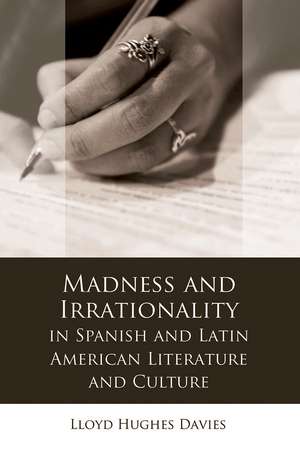Madness and Irrationality in Spanish and Latin American Literature and Culture: Iberian and Latin American Studies
Autor Lloyd Hughes Daviesen Limba Engleză Paperback – 30 oct 2020
Din seria Iberian and Latin American Studies
-
 Preț: 144.06 lei
Preț: 144.06 lei - 8%
 Preț: 459.36 lei
Preț: 459.36 lei - 11%
 Preț: 546.61 lei
Preț: 546.61 lei - 11%
 Preț: 508.33 lei
Preț: 508.33 lei - 8%
 Preț: 564.73 lei
Preț: 564.73 lei - 8%
 Preț: 494.03 lei
Preț: 494.03 lei - 8%
 Preț: 528.70 lei
Preț: 528.70 lei - 8%
 Preț: 529.23 lei
Preț: 529.23 lei - 8%
 Preț: 529.23 lei
Preț: 529.23 lei - 15%
 Preț: 549.02 lei
Preț: 549.02 lei - 8%
 Preț: 529.80 lei
Preț: 529.80 lei - 8%
 Preț: 377.45 lei
Preț: 377.45 lei - 13%
 Preț: 340.85 lei
Preț: 340.85 lei -
 Preț: 341.94 lei
Preț: 341.94 lei - 15%
 Preț: 452.10 lei
Preț: 452.10 lei - 10%
 Preț: 415.60 lei
Preț: 415.60 lei - 8%
 Preț: 459.90 lei
Preț: 459.90 lei - 15%
 Preț: 549.02 lei
Preț: 549.02 lei - 15%
 Preț: 549.02 lei
Preț: 549.02 lei
Preț: 340.37 lei
Nou
Puncte Express: 511
Preț estimativ în valută:
65.17€ • 67.86$ • 54.07£
65.17€ • 67.86$ • 54.07£
Carte indisponibilă temporar
Doresc să fiu notificat când acest titlu va fi disponibil:
Se trimite...
Preluare comenzi: 021 569.72.76
Specificații
ISBN-13: 9781786835758
ISBN-10: 1786835754
Pagini: 272
Dimensiuni: 133 x 210 x 15 mm
Greutate: 0.31 kg
Editura: University of Wales Press
Colecția University of Wales Press
Seria Iberian and Latin American Studies
ISBN-10: 1786835754
Pagini: 272
Dimensiuni: 133 x 210 x 15 mm
Greutate: 0.31 kg
Editura: University of Wales Press
Colecția University of Wales Press
Seria Iberian and Latin American Studies
Notă biografică
Lloyd Hughes Davies is Assistant Professor in the Department of Modern Languages, Translation and Interpreting, Swansea University. His main area of interest is contemporary Spanish American literature, particularly the novels of Argentina and Colombia.
Cuprins
Acknowledgements
1. Introduction
2. The Concept of National Madness: the Argentine Paradigm
3. ‘Voices in the Wilderness’: Conquest and Counter-conquest in Abel Posse
4. Morality, Madness, Memory: Royal Women in Fernando del Paso (Noticias del Imperio) and Lourdes Ortiz (Urraca).
5. Crime, Madness, Art: Alejandra Pizarnik and Manuel Vázquez Montalbán
6. Books about Books: Ruiz Zafón’s La sombra del viento and Pérez-Reverte’s El club Dumas
7. Self-Consciousness and Schizophrenia: the Literary World of Nuria Amat
8. Joy in Paradise: José Lezama Lima
9. Desert, Delirium, Digression: the Fictional Worlds of Juan José Saer
10. Conclusion
Bibliography
Index
1. Introduction
2. The Concept of National Madness: the Argentine Paradigm
3. ‘Voices in the Wilderness’: Conquest and Counter-conquest in Abel Posse
4. Morality, Madness, Memory: Royal Women in Fernando del Paso (Noticias del Imperio) and Lourdes Ortiz (Urraca).
5. Crime, Madness, Art: Alejandra Pizarnik and Manuel Vázquez Montalbán
6. Books about Books: Ruiz Zafón’s La sombra del viento and Pérez-Reverte’s El club Dumas
7. Self-Consciousness and Schizophrenia: the Literary World of Nuria Amat
8. Joy in Paradise: José Lezama Lima
9. Desert, Delirium, Digression: the Fictional Worlds of Juan José Saer
10. Conclusion
Bibliography
Index
Recenzii
“Drawing on Nietzsche’s comment that ‘Plato was speaking for the whole of humanity when he said: “From madness Greece has derived its greatest benefits,” and Virginia Woolf’s insight that ‘as an experience, madness is terrific,’ Lloyd Davies’s new book is a fantastically comprehensive study of madness and irrationality in Spanish and Latin American literature and culture. This is a cornucopia of madness with—as you might expect—examples of Quixotic madness, but we are also regaled with tales of clinical madness, political madness (the “locas” of the Plaza de Mayo), Baroque madness, cultural madness, linguistic madness, feminist madness, criminal madness, homosexual madness, existential madness, and even bookish madness. Full of original insight and penetrating readings!’
“This is a remarkably wide-ranging and cultivated book, which manages to be very focused and detailed. As a study of ‘madness’ as played out in culture and in Spanish and Spanish American literature in particular, it effortlessly interweaves Hispanic thought and expression with other European and Anglo-American approaches. The author offers a theory of madness in an explicitly Hispanic context, focusing compellingly on Spain’s mythical foundations and the prosecution of the idea of a Spanish “nation” via exclusionary rhetoric, and on various forms of “national madness” in Latin America linked to debates about Civilisation and Barbarism, violence and terror. A series of interpretative readings of literary texts manifest different aspects of the discourse of ‘madness,’ covering thematic aspects such as history, politics, resistance to patriarchy, literature, reading and writing, joy and imaginative freedom, the existential, and the pursuit and problematisation of reality and truth.’
